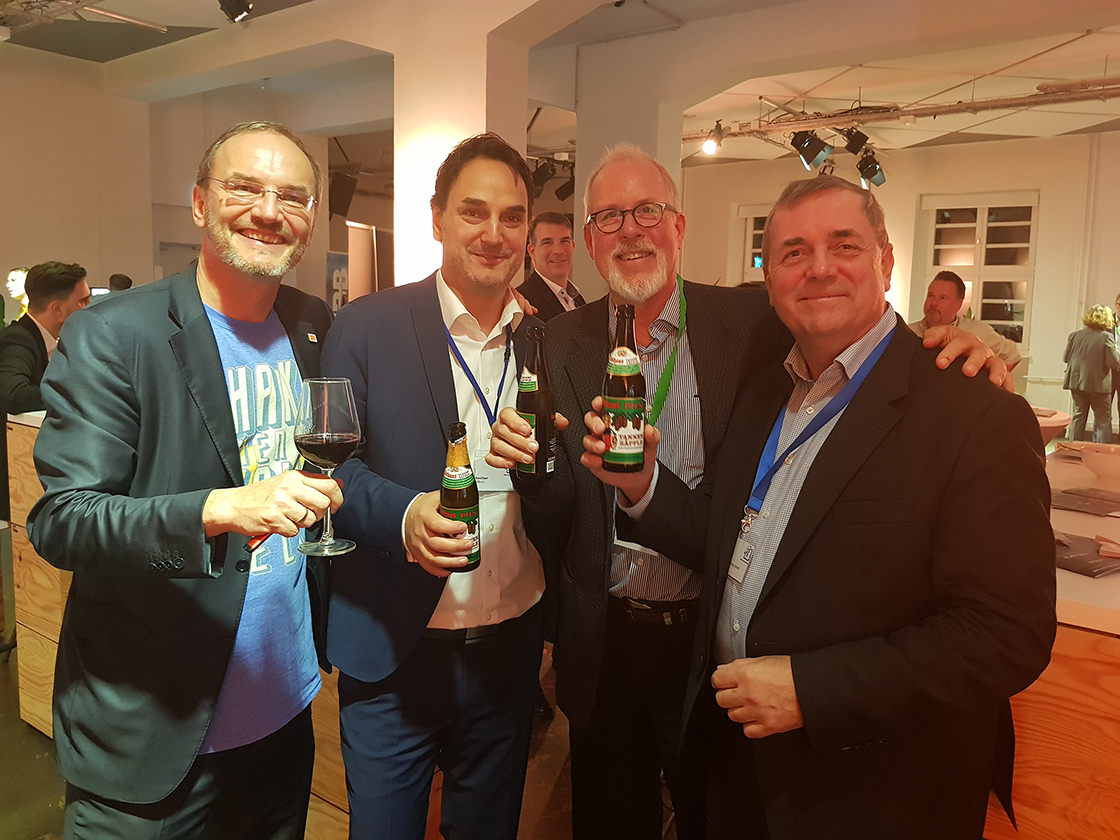On 24 October 2019, the first German convention on the use of Low-code platforms as a key technology for the digital transformation took place at Spielfeld Digital Hub in Berlin-Kreuzberg. With five keynote speakers and 18 expert lectures, 14 exhibitors, and 160 selected guests, mostly CDOs, CIOs or their representatives, it was Europe’s largest manufacturer-independent Low-Code conference to date. The event was organized by the industry association of the Berlin/Brandenburg IT industry, the SIBB.
Keynote speeches for technical information
Scopeland Technology was represented with a keynote, a breakout session, the moderation of a hands-on session on the topic of “Procedural models for Low-Code projects,” and its own trade fair booth. Karsten Noack’s keynote “What’s Already Possible Today: Low-Code Beats Java Programming by Leaps and Bounds” was followed with great interest. Noack made clear that Low-Code is one of the key technologies of the digital transformation, which primarily has to do with the speed at which digitalization ideas can be implemented. Moreover, the use of Low-Code increases efficiency by a factor of ten, and realistically at least 98% of the code can be generated automatically.
According to Noack, in Germany there is no clear differentiation between professional Low-Code developers and citizen developers. Low-Code developers tend to be a mix of both. They could be called ‘professional citizen developers’. As it were, the providers are also faced with entirely different challenges that companies must fulfill with their business models. As a result, a new kind of job description is emerging in Germany: the Low-Code developer.
At the kick-off of Berlin Low-Code Days, Jan Berger, CEO of the futurology institute 2b AHEAD talked about the future of software development. The question is whether it is realistic to think that in 2030, software will still be developed by dozens of programmers typing hundreds of thousands of lines of cryptic programming code on their keyboards. The next keynote speech by John Rymer, Vice President and Principal Analyst at Forrester Research, was highly anticipated. He coined the term ‘Low-Code’ in 2014 and has been instrumental in shaping the trend ever since. The name combines various lines of development which are intended to minimize the time it takes to manually program when developing application software. The uniform description introduced by him has led to greater recognizability and acceptance. Under the auspices of John Rymer, Forrester Research regularly compares Low-Code providers in Forrester Wave TM. Many providers that have been named leaders in the report were also represented at Berlin Low-Code Day.
Examples are Scopeland Technology, Mendix and OutSystems as well as Norwegian Low-Code provider Neptune Software, whose co-founder and CEO Andreas Grydeland Sulejewski was represented with another keynote on the topic of “Bridging Business and IT – from Low-Code to Pro Code.” The morning was rounded off by Roland Hörmann, CEO & co-founder of SIB Visions with the keynote “Low-Code in Practice: The Truth and Future of Low-Code.”
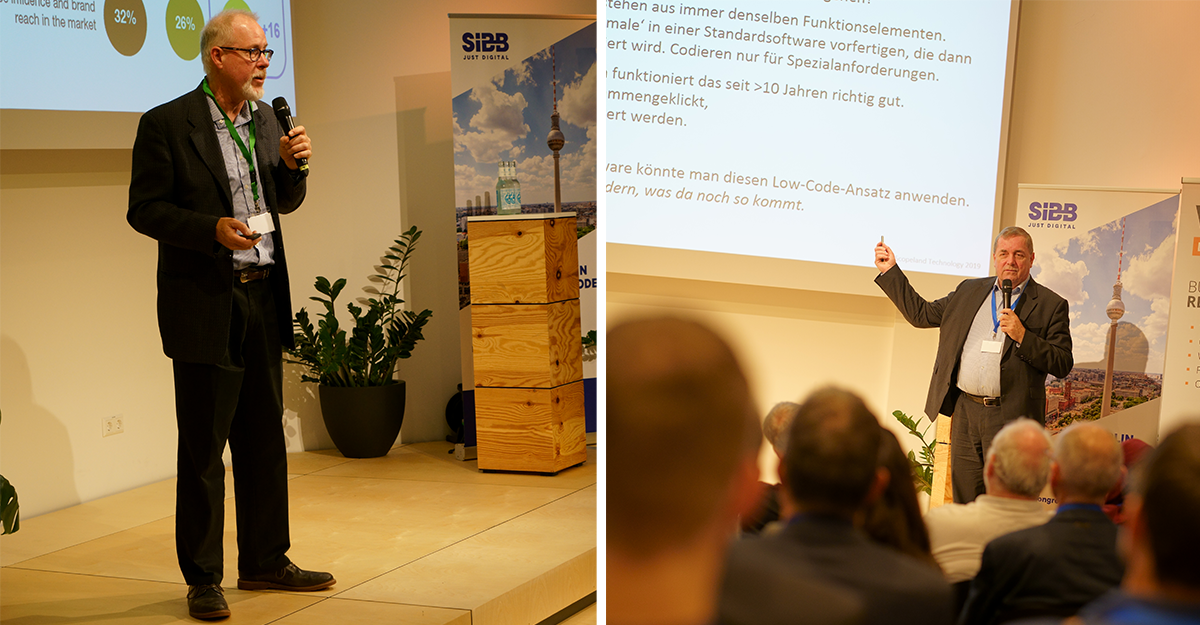
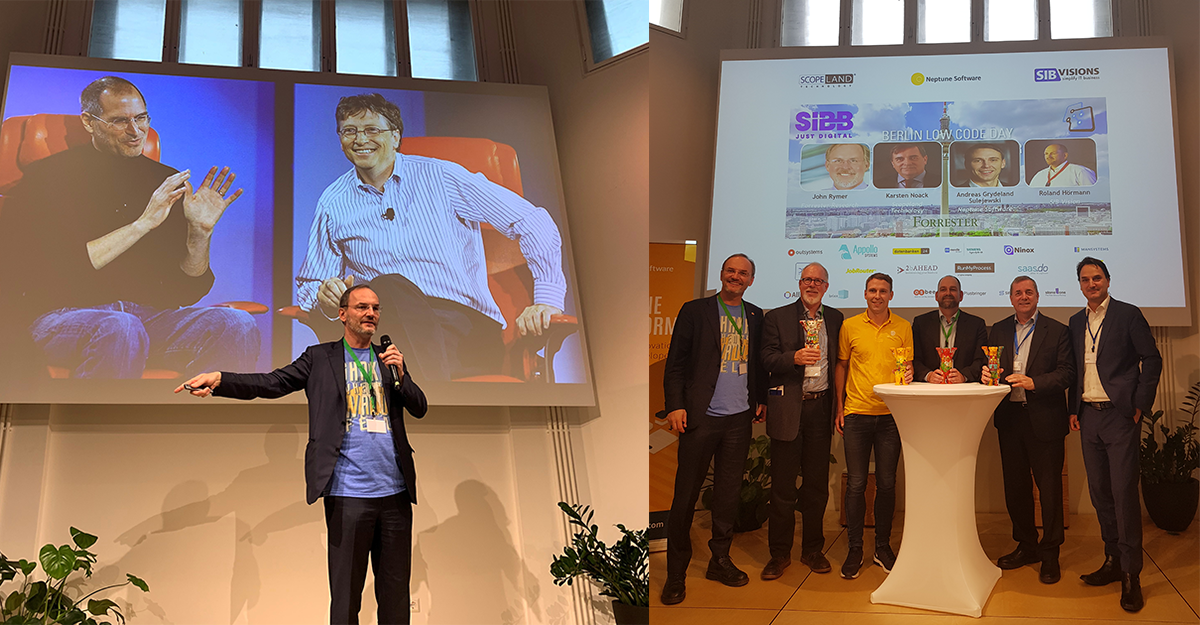
Interactive sessions and booths offer room for discussions
It was important to the organizers to make Berlin Low-Code Day more interactive and interesting than traditional conventions. Interactive breakout sessions were held 18 times for 20 minute each, offering plenty of opportunity to present the own business as well as innovations. Thomas Wolf, Managing Consultant at Scopeland Technology used his workshop to highlight the requirements for the Low-Code platform due to the demanding technical applications in business and administration. What became clear is that on-premise will dominate in Germany for the foreseeable future, and that such environments will not challenge SCOEPLAND.
Many important providers of Low-Code platforms made it to Berlin-Kreuzberg for the premiere of Berlin Low-Code Day. Among the exhibitors were Mendix, OutSystems, SIB Visions, and Neptune Software. In its presentation, Mendix demonstrated its focus on microservices. OutSystems went far beyond talking about their own Low-Code platform under the heading ‘Digitalization’. It was plain to see that both companies consider themselves to be market leaders. The offerings of the various providers were wide-ranging. While Mendix was represented together with its EPR solution service provider Mansystems and Ninox Software talked about ‘No Code’, simplifier discussed Low-Code on the basis of modern web technologies, and Synesty was primarily focused on an e-commerce customer project.
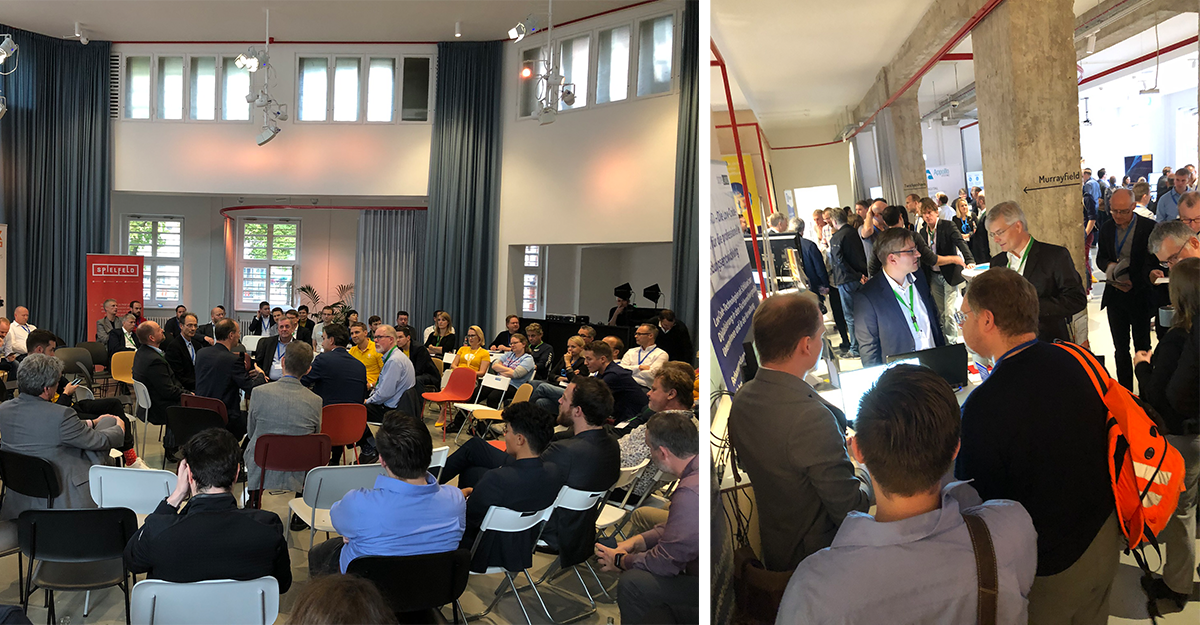
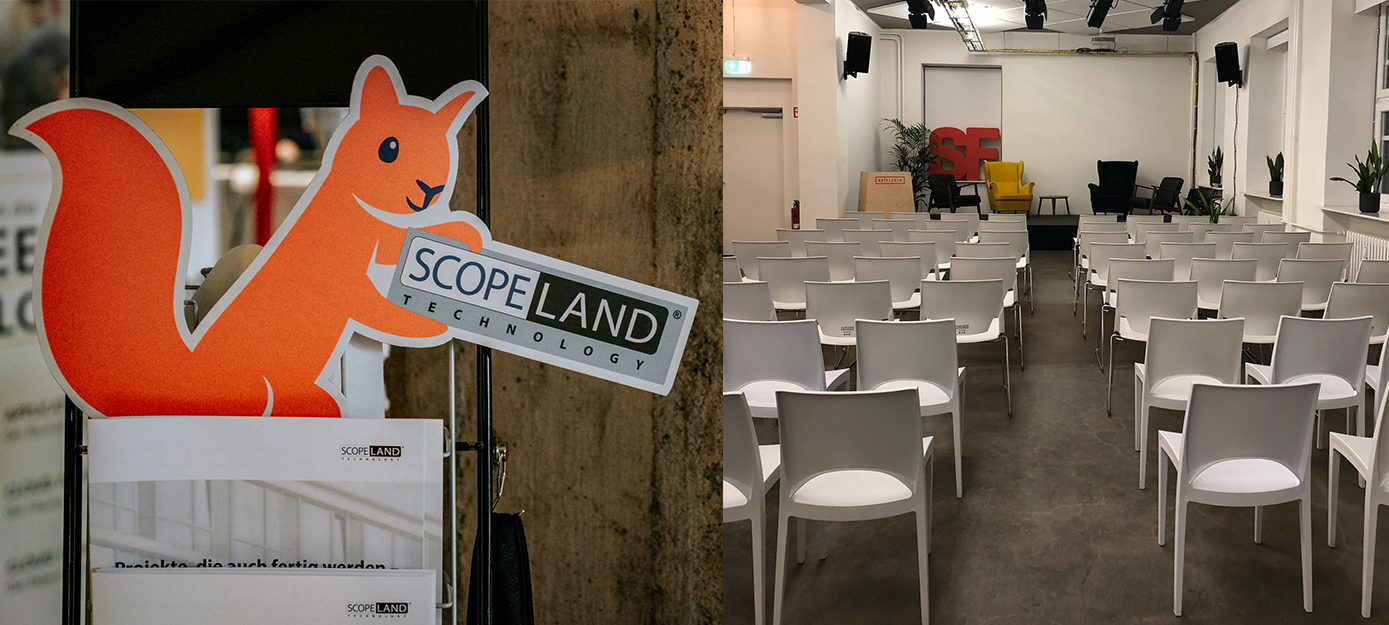
Various questions were addressed in a fishbowl discussion, in which the participants are seated in an inner and outer circle and alternatingly hold discussions. Providers and users talked to each other in so-called hands-on sessions, which was the final event of the day. Claudia Peißert, Head of Project Management and Production Services at Scopeland Technology, guided one of these interactive sessions. The topics discussed were whether Low-Code development works with or against IT, the new job title ‘Low-Code developer’, and various approaches for Low-Code projects.
SCOEPELAND 7 was introduced
The most frequented booth was that of Scopeland Technology, who released the latest version of SCOPELAND 7 at Berlin Low-Code Day. For the first time, it is now possible for all specialist applications created with SCOPELAND to be available fully automatically in response design and thus for them to be operated on all conceivable end devices. What makes this special is not the responsive design as such, because that's standard nowadays. What sets this apart is that the new process requires little additional effort in customizing the user interface of developed applications to the different target platforms. At the Berlin Low-Code Day, a Scopeland employee developed a form-based database application designed for large monitors live in front of the guests. Then he picked up his smartphone and launched the same program developed for desktops. And there it was: Absolutely everything is correct and ergonomic, and has become a mobile application all by itself, as it would be expected from programs that are programmed for mobile devices.
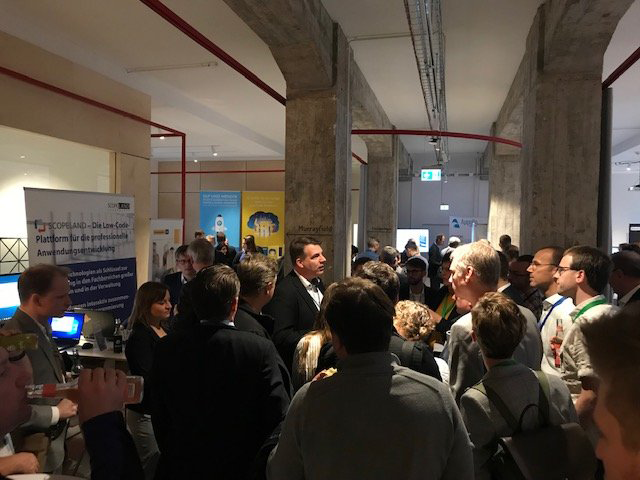
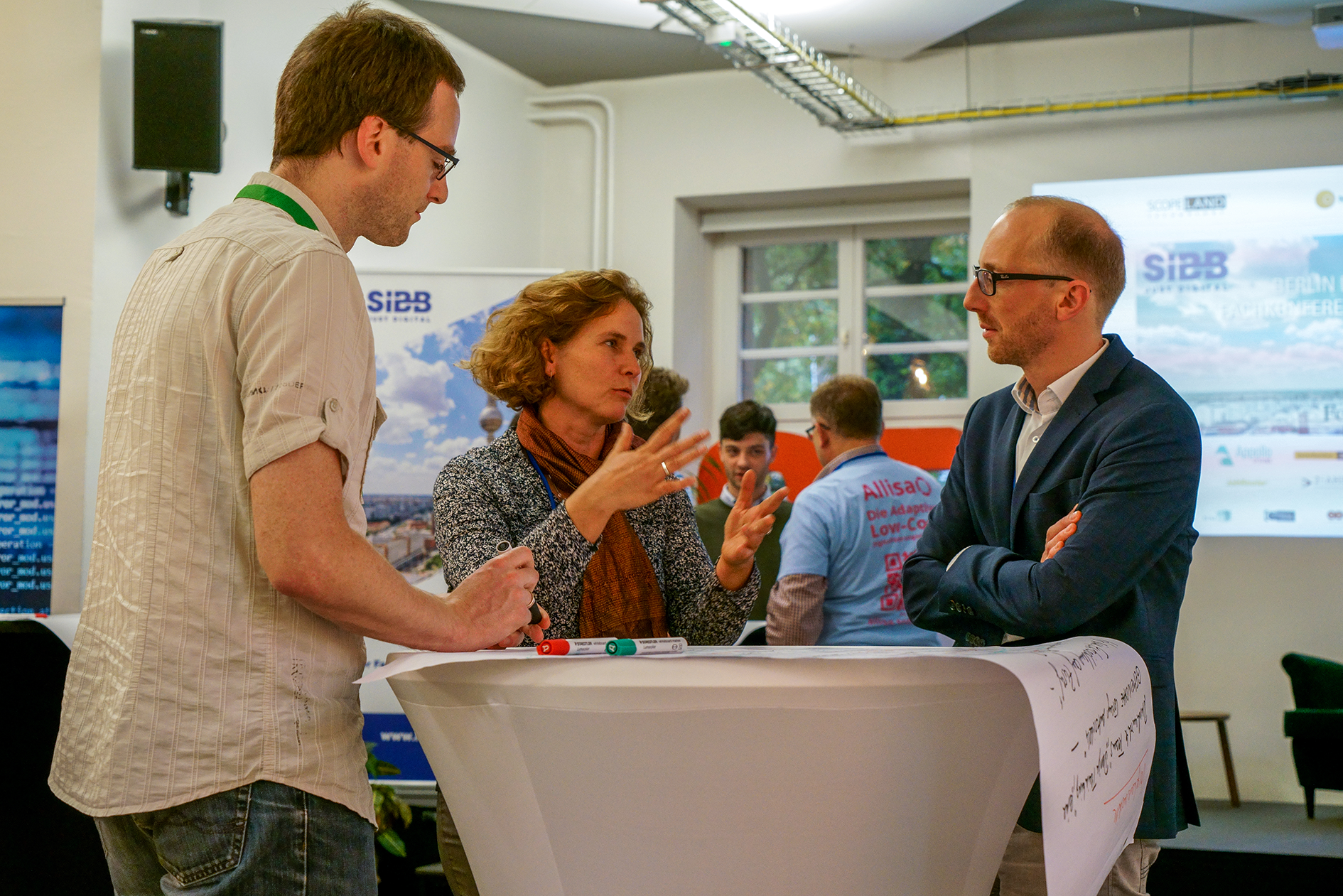
Successful premiere
SIBB was beyond successful in finding a balance between technical input and active participation. The participants were able to get a comprehensive overview of which providers exist and how they differ from each other. Many people voiced that it was great to test the systems live and to personally get to know the manufacturers. It was also positively received that not only the large providers were on site, and the fact that there were numerous platforms to learn about.
What emerged as particularly surprising at the lectures’ and exhibitors’ booths was the realization of how strongly the market has grown and will continue to grow. Many medium-sized companies, such as GOD with the datenbanken24 software, Appollo Systems, Jobrouter, and Necara with saas.do have established themselves in the Low-Code sector. The flurry of activity and large participation in the guided tours to the individual stands showed just how great the interest is, both on the side of the manufacturers and the users.
The modern, relaxed atmosphere of the Spielfeld location contributed significantly to the success of the event. At the final networking event with beer, wine, and sandwiches, it was discussed at length how and where to establish Low-Code teams and whether it is tactically wise to talk about ‘Factor 10’ – regardless of whether or not this is achieved.
